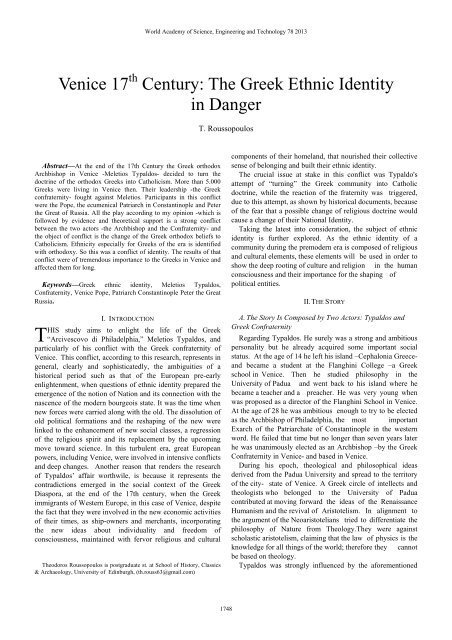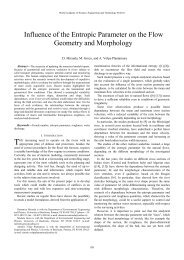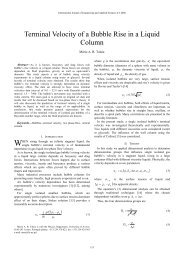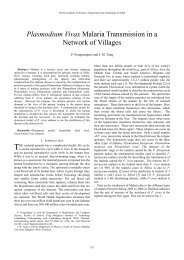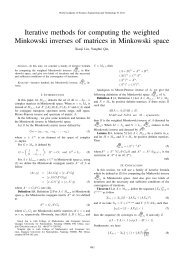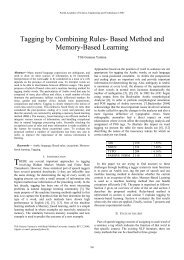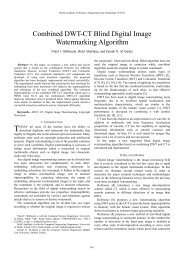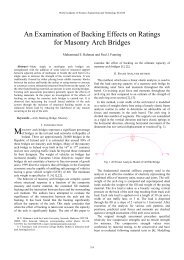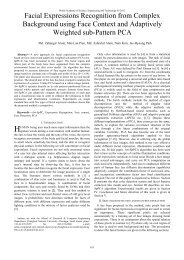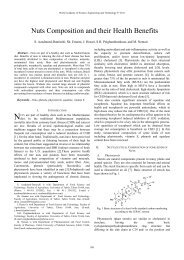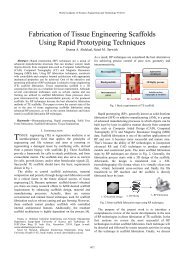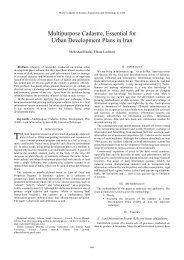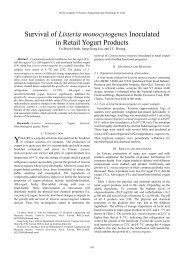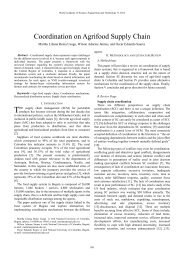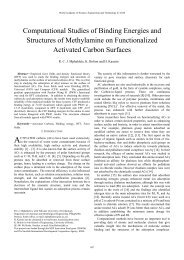The Greek Ethnic Identity in Danger - World Academy of Science ...
The Greek Ethnic Identity in Danger - World Academy of Science ...
The Greek Ethnic Identity in Danger - World Academy of Science ...
Create successful ePaper yourself
Turn your PDF publications into a flip-book with our unique Google optimized e-Paper software.
<strong>World</strong> <strong>Academy</strong> <strong>of</strong> <strong>Science</strong>, Eng<strong>in</strong>eer<strong>in</strong>g and Technology 78 2013<strong>The</strong> connection <strong>of</strong> the ethnic identity with ethnie, or“ethnicity” as it is here<strong>in</strong> conceptualized, makes it to differfrom other <strong>in</strong>terpretations <strong>of</strong> ethnicity used today by the most<strong>of</strong> political scientists specialized on ethnic politics [3]. <strong>The</strong>latter usually adopt the def<strong>in</strong>ition <strong>of</strong> Horowitz, who seesethnicity as a concept that “easily embraces groupsdifferentiated by colour, language, and religion: it covers‘tribes’, ‘races’, ‘nationalities’, and castes”[4]. Horowitzdef<strong>in</strong>ition refers to contemporary ethnicities and cannotcapture the mean<strong>in</strong>g <strong>of</strong> the pre-modern ones therefore, for thepurposes <strong>of</strong> the current analysis, it seems pert<strong>in</strong>ent to identifyethnicity with that <strong>of</strong> “ethnie”, as it is def<strong>in</strong>ed by Smith.Smith’s theory, despite that it does not touch the politicalaspect <strong>of</strong> an ethnic identity, he could be viewed as a bridge“between stark modernist theories defend<strong>in</strong>g the recent,<strong>in</strong>vented and constructed nature <strong>of</strong> nations and nationalism(Gellner, Hobsbawm and Ranger, Anderson), andprimordialist theories emphasiz<strong>in</strong>g the permanence <strong>of</strong> nations(van de Berghe, Geertz, Armostrong)”[5].While Smith agreeswith the previous mentioned authors that nationalism is amodern phenomenon, he <strong>in</strong>sists that nations have pre-modernorig<strong>in</strong>s.<strong>The</strong> importance given by the people to a presumed commonancestry and shared historical memories, as well as theirconnection with a specific ‘homeland’ and a developed sense<strong>of</strong> solidarity, do not derive only from identity politics, but als<strong>of</strong>rom the desire <strong>of</strong> people for security and rootedness; also,from their need for dignity and respect [6].<strong>The</strong>se human needshave been used not only by nationalist politics but also <strong>in</strong> thepre-modern years by ethnic politics <strong>in</strong> order to obta<strong>in</strong> socialcohesion and centralization. <strong>The</strong> members <strong>of</strong> a group <strong>of</strong>people, through the historical memories and legends abouttheir distant ancestors, cultivate the myth <strong>of</strong> their commonorig<strong>in</strong>, which, <strong>in</strong> cont<strong>in</strong>uity, becomes the focus <strong>of</strong> identitypolitics.In any case, <strong>in</strong> the pre-<strong>in</strong>dustrial societies <strong>of</strong> early modernEurope, religion was <strong>of</strong> fundamental importance <strong>in</strong> mak<strong>in</strong>gsense <strong>of</strong> personal and collective social, cultural and spiritualpractices. In agreement with von Greyerz’s [7]. <strong>in</strong>terpretation<strong>of</strong> religion (who cites the respective def<strong>in</strong>ition <strong>of</strong> ThomasLuckmann [8]. religion could be seen as a sociallyconstructed, more or less solidified, more or less obligatorysystem <strong>of</strong> symbols, that comb<strong>in</strong>e the legitimation <strong>of</strong> naturaland social orders and mean<strong>in</strong>gs with practical <strong>in</strong>structionsgiven to the <strong>in</strong>dividuals on how to live.Argu<strong>in</strong>g about <strong>Greek</strong> ethnicity we would like to say thatthis is a k<strong>in</strong>d <strong>of</strong> cultural – religious beliefs and values but alsoa sense <strong>of</strong> common orig<strong>in</strong>. This sense <strong>of</strong> common orig<strong>in</strong> tied<strong>Greek</strong> <strong>in</strong>dividuals together; it was a strong connection amongthem and cultivated also –as it seems out <strong>of</strong> their writ<strong>in</strong>gs- acommon nostalgia and pa<strong>in</strong> for their enslaved fatherland. It’sobvious that these beliefs, values and the sense <strong>of</strong> commonorig<strong>in</strong> separated them from other people and created theirethnic identity. In order to def<strong>in</strong>e this identity, <strong>Greek</strong>s used theword “Genos”- and very <strong>of</strong>ten the word “Ethnos”, a <strong>Greek</strong>synonym <strong>of</strong> Nation. <strong>The</strong> word genos affirms a k<strong>in</strong>ship groupwhich identifies itself as a unit. <strong>The</strong> term derives from theword “g<strong>in</strong>omai” which can be translated as “becom<strong>in</strong>g”. Sothe word “genos” is connected with the common orig<strong>in</strong> aswell as the common cultural and religious features <strong>of</strong> a group<strong>of</strong> people, therefore, we can see it as a synonymous <strong>of</strong> theterm “nation”, from the lat<strong>in</strong> verb nacsor. Dur<strong>in</strong>g Ottomansoccupation, the word acquired an additional mean<strong>in</strong>g becauseit has been accompanied with the dreams <strong>of</strong> the <strong>Greek</strong> peoplefor liberation from the Turkish slavery. As it is proved frommany local rebellions, written documents. In the eighteenthcentury, under the <strong>in</strong>fluence <strong>of</strong> the ideas <strong>of</strong> the Enlightenmentand the optimistic outlook for the creation <strong>of</strong> an autonomous<strong>Greek</strong> state, the concept <strong>of</strong> the genos escaped the boundaries<strong>of</strong> ethnicity and was identified more or less with that <strong>of</strong> thenation [9].One could ask, how could be expla<strong>in</strong>ed the long termcont<strong>in</strong>uousness <strong>of</strong> the <strong>Greek</strong> <strong>Ethnic</strong> <strong>Identity</strong> <strong>in</strong> thecommunities <strong>of</strong> the <strong>Greek</strong> Diaspora, from the middle <strong>of</strong> thefifteenth century, till the war <strong>of</strong> the <strong>Greek</strong> Independence, thatis, <strong>in</strong> 1821? From the many reasons <strong>of</strong> this duration, wesummarize the follow<strong>in</strong>gs:First. <strong>The</strong> deep historical roots <strong>of</strong> the <strong>Greek</strong> ethnic identity.Due to its historical orig<strong>in</strong> it is founded <strong>in</strong> the <strong>Greek</strong> mythsand customs and, through them, it is well embedded <strong>in</strong> thecollective memory and consciousness <strong>of</strong> the <strong>Greek</strong> people.Second. It is connected with the <strong>Greek</strong> language and theorthodox dogma which dom<strong>in</strong>ated <strong>in</strong> the Byzant<strong>in</strong>e Empire,and the <strong>Greek</strong> consciousness that the upper class <strong>of</strong> thisempire shaped, particularly dur<strong>in</strong>g the last centuries <strong>of</strong> it,before its occupation from the Ottomans. Due to the politicsthat the <strong>Greek</strong> <strong>in</strong>tellectuals cultivated <strong>in</strong> the cities <strong>of</strong> the <strong>Greek</strong>Diaspora after their exile from Constant<strong>in</strong>ople and, ma<strong>in</strong>ly,due to the religious politics <strong>of</strong> the <strong>Greek</strong> Patriarchate, which<strong>in</strong>stitutionalized <strong>Greek</strong> schools, churches and monasteries, the<strong>Greek</strong> ethnicity rema<strong>in</strong>ed alive till the eighteenth century,when the representatives <strong>of</strong> the <strong>Greek</strong> enlightenment workedhard for the transformation <strong>of</strong> the ethnic identity to a nationalone.Third. This duration is particularly manifested <strong>in</strong> casesthat <strong>Greek</strong> m<strong>in</strong>orities were established <strong>in</strong> Western cities orstates, such as Venice, which were religiously tolerant.<strong>The</strong>refore we <strong>in</strong>sist that the question <strong>of</strong> <strong>Ethnic</strong> identity wasthe only accountable reason to expla<strong>in</strong> such a sharp contrast toTypaldos’s plans.At that po<strong>in</strong>t we would like to refer more analytically to thereligion’s side <strong>of</strong> the <strong>Identity</strong>. Let’s take <strong>in</strong>to considerationthat an ethnicity to be strong need to be anchored by thehuman consciousness dur<strong>in</strong>g the first years <strong>of</strong> socialization <strong>of</strong>a human be<strong>in</strong>g. This anchor<strong>in</strong>g is shaped by the use <strong>of</strong>symbolic mechanism such as religion, language, habits etc.<strong>The</strong> orthodox religion is full <strong>of</strong> symbols and icons that graspthe <strong>in</strong>dividual consciousness from its childhood. Also we musttake <strong>in</strong>to consideration that the <strong>Greek</strong> people, dur<strong>in</strong>g his longenslavement under the Ottomans, found <strong>in</strong> their religion aspiritual space <strong>of</strong> belong<strong>in</strong>g. Through religion and their mythsand customs even <strong>in</strong> rituals they ma<strong>in</strong>ta<strong>in</strong>ed this sense <strong>of</strong>1750
<strong>World</strong> <strong>Academy</strong> <strong>of</strong> <strong>Science</strong>, Eng<strong>in</strong>eer<strong>in</strong>g and Technology 78 2013belong<strong>in</strong>g which is one <strong>of</strong> the ma<strong>in</strong> elements for the formation<strong>of</strong> an ethnic <strong>Identity</strong>.Certa<strong>in</strong>ly, religious faith, just like language, does notalways differentiate one ethnicity from the others. Differentethnicities may share the same religion and the same language.Only <strong>in</strong> cases that religion or culture <strong>in</strong> general, isaccompanied by a shared belief, as previously mentioned, <strong>in</strong>regard to the common descent <strong>of</strong> its members, the formation<strong>of</strong> ethnic identity takes place. In the case <strong>of</strong> <strong>Greek</strong>s <strong>in</strong> Venice,a deep faith <strong>in</strong> their common orig<strong>in</strong>, on the one hand, and along tradition <strong>of</strong> religious, orthodox rituality, on the other,both contributed, through their repetition from generation togeneration, to the creation <strong>of</strong> a powerful ethnic identity.Moreover, identity politics, elaborated by Orthodox Church,contributed to the ma<strong>in</strong>tenance and enforcement <strong>of</strong> thistradition and consequently to the forg<strong>in</strong>g <strong>of</strong> their ethnicidentity.REFERENCES[1] Smith, A. (1986) <strong>The</strong> <strong>Ethnic</strong> Orig<strong>in</strong>s <strong>of</strong> Nations. Oxford: Blackwell, p.32.[2] Smith, A. Nations and Nationalism <strong>in</strong> a Global Era, Cambridge: PolityPress, 1995: 86.[3] See, Chandra, K. Why <strong>Ethnic</strong> Parties Succeed. Cambridge: CambridgeUniversity Press, 2004; Posner, D. Institutions and <strong>Ethnic</strong> Politics <strong>in</strong>Africa. Cambridge: Cambridge University Press, 2005; Varshney, A.<strong>Ethnic</strong> Conflict and Civic Life. New Haven, CT: Yale University Press[4] Horowitz, D. <strong>Ethnic</strong> Groups <strong>in</strong> Conflict. Berkeley: University <strong>of</strong>California Press.[5] Guibernau, M. (2004) “Anthony D. Smith on nations and nationalidentity: a critical assessment”, Nations and Nationalism, 10 (1/2), 125-141, p. 126.[6] Smith, A. Nations and Nationalism <strong>in</strong> a Global Era. Cambridge: PolityPress, 1995, p. 155.[7] Von Greyerz, K. Religion and Culture <strong>in</strong> Early Modern Europe, 1500-1800. Oxford: Oxford University Press, 2007, p. 4.[8] Luckmann, T. Luckmann, "E<strong>in</strong>leitung," (Introduction) <strong>in</strong> B.Mal<strong>in</strong>owski, Magie, Wissenschaft und Religion und andere Schriften,Frankfurt, 1973,p. ix.[9] Svoronos Nikos G., <strong>The</strong> <strong>Greek</strong> Nation, born and shap<strong>in</strong>g <strong>of</strong> the NewHellenism. Athens: Polis, 2004: 221751


